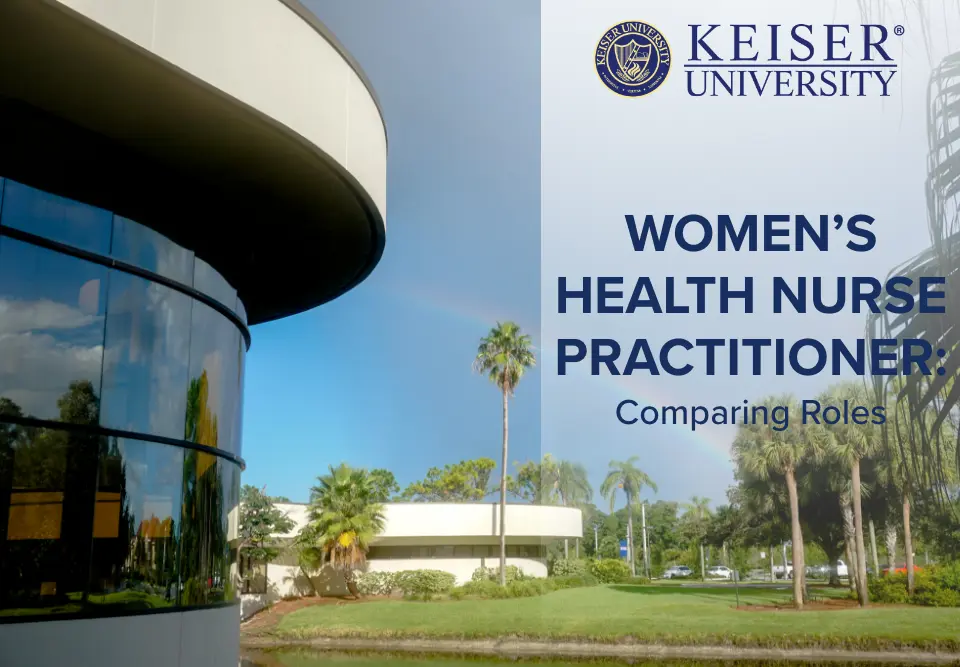If you are a nursing student looking to specialize in women’s health, you may have heard of the WHNP (women’s health nurse practitioner) certification. But what is a WHNP? How does it differ from similar roles?
What Is a WHNP?
A WHNP, or women’s health nurse practitioner, is a registered nurse who has completed additional training and education in women’s health. They are qualified to provide care for women of all ages, from pre-adolescence through post-menopause.
We met with Dr. Lawren Mundy to learn firsthand about the reality of life as a WHNP. Dr. Mundy has been a women’s health nurse practitioner for 18 years and has taught future WHNPs for Keiser University for the past six years. Read on to learn more about this fulfilling career path and how it compares to other roles in the women’s healthcare field.
Comparing WHNPs to Similar Roles
Women’s health is a vital and growing field within the medical profession. There are a variety of roles for medical professionals working in this field, from providing primary care to specialized care for pregnant women and new mothers. In addition to traditional medical care, many women’s health providers also offer mental health support and counseling and guidance on healthy lifestyle choices. With the increasing focus on women’s health, there has never been a better time to enter this rewarding and demanding field. Those who are passionate about helping women live their best lives will find a wealth of opportunities in women’s health. Women’s health nurse practitioners are but one of the various roles available in the field. How does the job of a WHNP compare to other women’s healthcare professionals?
FNP vs. WHNP
Choosing between a career as a family nurse practitioner (FNP) or a women’s health nurse practitioner (WHNP) can be a difficult decision. Both types of nurses provide vital care to patients, but they have different areas of focus. FNPs typically provide primary care to patients of all ages and genders, while WHNPs specialize in providing care to women throughout their lifespans. Both types of nurses need a strong foundation in general and specialized nursing care, but WHNPs also need an in-depth understanding of reproductive health. WHNPs are often the primary care providers for women who are pregnant or hope to become pregnant, and they play an essential role in providing screenings and counseling services to women throughout the lifespan. FNPs typically provide more general care services and don’t provide care to pregnant women.
WHNP vs. CNM
Both certified nurse midwives (CNMs) and WHNPs are advanced practice registered nurses (APRNs) who provide comprehensive care to women of all ages. While CNMs focus primarily on obstetrics & reproductive health care, WHNPs encompass a broader scope of care that includes primary care, gynecology, and obstetrics.
The main difference between CNMs and WHNPs is the type of patients they see. CNMs typically see healthy women who are planning to become pregnant or are already pregnant. In contrast, WHNPs see women of all ages, including those who may be experiencing problems with their reproductive health.
Both CNMs and WHNPs complete advanced training and obtain certification in their chosen specialty. CNMs must pass a national certification exam administered by the American Midwifery Certification Board (AMCB). WHNPs have to be certified as well through the National Corporation Certification.
If you’re interested in providing comprehensive care to women throughout their lifespan, then becoming a WHNP may be the best route for you. However, if you’re specifically interested in reproductive health care, then becoming a CNM may be a better fit.
Midwife vs. Women’s Health Nurse Practitioner
Midwives and women’s health nurse practitioners offer high-quality, comprehensive care for women of all ages. However, there are some critical differences between the two. Midwives are explicitly trained in pregnancy, childbirth, and postpartum care. They are experts in low-risk pregnancies and typically have a more holistic approach to care. In addition to pregnancy and childbirth care, WHNPs provide well-woman exams, family planning services, and menopause management.
OGNP vs. WHNP
OB/GYN (obstetrics/gynecology) nurse practitioners and women’s health nurse practitioners both provide care for women of all ages. The role is the same, even though the title can vary depending on the facility in which they work. The difference in name comes from the fact that WHNPs work in the specialty area of Obstetrics/Gynecology (OG). WHNPs often apply for OGNP jobs positions, and those jobs often require WHNP board certification.
WHNP vs. OBGYN
OBGYNs and WHNPs are both qualified to provide a full range of care for women, including well-woman visits, contraceptive counseling, and managing pregnancy and menopausal symptoms. However, WHNPs generally have more preventive care and counseling training, while OBGYNs are physicians who have completed medical school and residency training in women’s health. They can provide all aspects of care, from preventive care to complex surgeries. WHNPs, on the other hand, are registered nurses who have completed advanced education and training in women’s health. They provide primary and preventive care, as well as manage chronic conditions. In general, WHNPs have a more holistic approach to care than OBGYNs. They focus on educating and empowering patients to make healthy choices. Both providers are vital in ensuring women receive the high-quality care they need.
WHNP Benefits & Advantages
A career as a women’s health nurse practitioner can be gratifying. These nurses play a crucial role in supporting women’s health and well-being. WHNPs typically have a strong interest in women’s rights and reproductive justice. They are passionate about providing quality care to their patients. In addition to clinical work, WHNPs may also be involved in research, education, and advocacy, allowing them to impact change at a systems level and make a lasting difference in the lives of the women they serve. If you are interested in making a positive difference in women’s lives, consider these five benefits of a career as a WHNP.
1. Personal Connection
One of the many benefits of becoming a women’s health nurse practitioner is that they are able to build personal relationships with their patients. This allows them to get to know their patients more personally, understand their unique needs, and provide more tailored care to their patients. Your patients will also get to know you. Dr. Mundy shared a story about a patient who had given birth a year prior and remembered that the doctor had a sister. Dr. Mundy ended up showing the patient pictures of her nephew and catching up.
Taking the time to build this rapport can often lead to better health outcomes for patients, as they are more likely to follow their care plan and take medications as prescribed. These personal connections can also make it easier for patients to discuss sensitive topics, such as sexual health or menopause, which can be challenging to discuss with a doctor or other healthcare provider. The ability of women’s health nurse practitioners to form personal relationships with their patients is a vital part of providing high-quality care and a gratifying aspect of this profession.
2. Extensive Care
WHNPs are trained to provide their patients with a wide range of healthcare services, from adolescence through menopause and beyond. Therefore, no two days will ever be the same, and you will never get bored in your job as a WHNP! You could provide routine well-woman care one day and work with a patient to manage her menopausal symptoms the next. You will have the opportunity to provide primary care, conduct research, teach patient education classes, and more. WHNPs also care for women who have been victims of domestic violence or sexual assault. As a result, WHNPs play an essential role in ensuring all women have access to quality healthcare.
3. Women’s Health Advocacy
WHNPs also play an important role in advocating for women’s rights and access to reproductive healthcare. If you’re passionate about these issues, a career as a WHNP could be a perfect fit for you. Organizations like NPWH (Nurse Practitioners in Women’s Health) actively work toward improving women’s lives through advocacy efforts focused on ensuring women have access to quality healthcare. As a professional on the frontline, there are few professions better positioned to speak on behalf of the underserved in our communities, making the impact of WHNPs outside the physician’s office or hospital potentially massive.
4. Flexibility
WHNPs work in a variety of settings, including hospitals, clinics, and private practices. They also work in research or education, family planning and preconception counseling clinics, or serve as primary care providers for women with chronic health conditions such as diabetes or heart disease. Some WHNPs may choose to work as part of a team in an obstetric or gynecologic practice. Some other WHNPs even open up their own practice. With so many options available, WHNPs can select the setting that best suits their skills and interests.
5. Help Communities in Need
In many parts of the world, access to quality healthcare is limited, especially for women and girls. This can lead to a host of problems, including a lack of knowledge about staying healthy and caring for oneself, an inability to get early treatment for illness or injury, and an increased risk of death or complications during pregnancy and childbirth. Women’s health nurse practitioners can help to fill this critical need. WHNPs often work with community organizations to provide education and outreach on topics like nutrition, hygiene, and sexual health. As a result, they play a vital role in improving the health of communities in need.
Become a WHNP at Keiser University
If you’re ready to start your career as a women’s health nurse practitioner, Keiser University has a program that can give you the education and training you need. Our curriculum is designed to prepare you for the licensure exam, and our faculty have extensive experience in the field of women’s health. In addition, our clinical partners provide opportunities for you to gain hands-on experience in various settings. Keiser University is the right choice if you’re looking for a program that will give you the skills and knowledge you need to succeed as a women’s health nurse practitioner. Contact us today to learn more about our program and how we can help you reach your goals.






 The instructors at Keiser University impacted my life. They believed in my ability to become a great graphic designer, regardless of how I felt about my skills. KU helped to prepare me for the real world and got me to where I am today.
The instructors at Keiser University impacted my life. They believed in my ability to become a great graphic designer, regardless of how I felt about my skills. KU helped to prepare me for the real world and got me to where I am today.
